Yesterday evening. I deem it a fine joint, given that it’s the first I’ve rolled in a quarter century, but Guddu’s tone has a dismissive note I don’t entirely care for at so milestone a moment. On what criterion does it fall short, I demand. Does it not draw well? Yes, he grudgingly concedes, smoke curling from nostrils, it draws well. As for the mix, heavy on charas, light on tobacco, he made it himself so can hardly complain on that score. What then?
Not a good shape.
Which means, I quickly establish, it lacks the requisite conical symmetry. Guddu is a Leo, as nice a set of folk as ever strode the Zodiac but, it has to be said, given to snobbery
* * *
Yesterday morning. We set off on his Honda, stopping at a tobacco stall close to his travel agency below my room on Gangaur Ghat. A man is being served, another waiting, but Guddu, neither alighting nor switching off his engine, orders cigarettes and is served in an instant. Neither waiting man shows resentment, which surprises me not one whit in this unabashedly hierarchical culture. Only as we drive away do I realise no money has changed hands, which does surprise me. I make a mental note to go shopping with Guddu more often. Like when I want something in pashmina or silver.
(A man of talent and singular grace, he’s not overburdened with modesty. He’s bright, and knows it; good looking, and knows it. Most important he is, at twenty-six, a man of substance and respect. And knows it. Though making his way in the world, he has solid if not high caste pedigree. Father worked up from chauffeuring a corporate big-shot to managing the TNC’s chauffeurs across India. Grandfather too was a chauffeur, in Mumbei, while great grandfather oversaw the Maharana’s stables at the Royal Palace in Udaipur. Here in this neighbourhood, in the house he was born to, he is bathed in and cradled by a deep sense of being exactly where he belongs. But that local respect born of family standing and rootedness in community has its counterweight in a man planted squarely within India’s urbane and boomingly confident young entrepreneurial class. A potent mix, it seems to me, in one with decades of active life ahead of him.)
After twenty minutes on the Delhi to Mumbei interstate heading north, we swing west on what looks like a country lane but was, Guddu assures me, the major highway to Jaipur prior to the interstate and its Alpine style tunnels through earth and rock. Here on our now sleepy byway, women bear baskets of soil and dung on their heads. I learn that £400k of local government money is to be spent on lining this barely used road with flower beds. I know where the flowers will be had, with many a shaded and watered field corner given over to dancing marigolds. But why line a ghost road with flowers?
A hundred metres on I have my answer. Where the old road reaches its zenith at the lowest feasible point on hills its usurper now simply bores through, we pass under two of the biggest portals I ever set eyes on; gated arches thirty foot high if they’re an inch. On higher ground to left and right, ancient fortifications can be seen. This was the northern outpost of the Rajput Kingdom, founded in 530 AD, of Mewar. Imagine, Guddu invites me, the days of Udai Singh II – he who, though but third in line to the throne, saw off regicide and fratricide to claim and hold it, and to shift his capital from Chittaurghaur to the city he in 1559 founded, the city of Udaipur.
For centuries the move would be vilified as craven betrayal but von Clausewitz would approve. Chittaurgarh could not be held against the might of the Mughals and their unusually astute emperor, Akhbar, who seven years on would indeed take the former capital but never did get his hands on the new one
(If Udai Singh II’s decision strikes us as incontestably vindicated, we have to factor in that for his critics, at the time and for generations to come, dishonour is worse than death. Two weeks ago I was in Jaisalmer, where in 1294 the women committed jauhar – leaping from the city walls, with their children, onto blazing pyres as their men rode out to equally certain death at the hands of vastly superior forces under Delhi’s Turkic ruler, Alauddin Kiljhi.)
My circuitous point being that this forlorn shadow of past glory – even the still manned Shiva temple looks sorry for itself – is about to get the floral equivalent of a lick of paint. All well and good, but of more interest to me – and tomorrow I’ll kick myself for being too lazy to get off the bike and take the shot – are the women in bright saris, half a dozen or more, toiling in sun and heady scent of manure to lay out those beds.
* * *
Next stop is a busy village. We buy water at a chai shop, one of the open-fronted sheds you see the length and breadth of India. Such is my trust in Guddu – I’ve made clear I’m in his hands – that when he instructs me to leave backpack housing £4k in camera kit behind the counter, as the proprietor nods assent, I don’t hesitate.
We can’t take pictures.
A minute’s walk gets us to the reason for this small town’s buzzing importance. Angkor Wat excepted, Eklingji is the finest Shiva temple complex I’ve seen. While Guddu buys malis to do diverse devotions, I leave shoes at a locker to examine ornately carved eighth century stone pillars, and watch in semi meditative state as devotees pray to a backdrop of flute and tabla supplied by cross-legged men in kurtas of pristine white, turbans of deep saffron. Leaving the main temple I wander at will, struck repeatedly by that similarity with Angkor Wat, Cambodia’s eastern outpost of Hinduism under the Khmers.
(I oversimplify here. Angkor’s wonders are a mix of Buddhist and Hindu, the faith of successive Khmer kings having swung between the two. Often, though thankfully not always, the first thing a new Buddhist or Hindu ruler did was destroy the artefacts of his predecessor. But for that fact – as much realpolitik as fanaticism; akin to the swings of Tudor England – the visible continuity would be even more extensive, showcasing by architectural similarity the fact that, as Jesus was nurtured in Judaism, so was Siddhartha in Hinduism.)
I’m not as a rule taken by Hindu religious architecture, too often vulgar at the side of its Islamic counterparts. But this is as far removed from the concrete crudities – crassly unimaginative constructs offset but never fully countered by splendid colour and iconic vibrance – adorning too many Himalayan beauty spots, and too many teeming street corners, as Wells Cathedral is from the brutalist end of Nonconformist functionalism.
Guddu, now back from puja, tells me that above the main temple is another, and only one man may visit it. That man being the Maharana of Udaipur. Could this account for the signs, big white on red text, to say photography is strictly forbidden? The first time I ever want to snap a Hindu temple outside Angkor and I can’t, courtesy the latest in a doubtless long line of inbred cretins, eleven toes minimum and more neuroses than Freud’s waiting room at opening time?
Only kidding. I’m sure he’s a capital chap.
* * *
Back at the chai shop I order bell pepper stuffed with potato chillhi; served with dipping bowl of sauce, orange hued and fiery on the tastebuds. It’s absolutely magnificent, as I knew it would be from the look of the batter, gold brown with a succulent glisten. (As with our own fish and chip shops, many an otherwise decent establishment lets itself down through substandard batter. And as with battered fish, you can tell good from middling – though not always middling from dire – just by looking.)
The proprietor, another friend of Guddu, is on a day of self imposed silence. I respect that: it’s a discipline I’ve submitted to myself on many occasions – on one retreat for three weeks – and commend it for reasons I won’t go into here.
He’s happy to be spoken to, however. I ask Guddu to:
Tell him his peppers are ultimate.
Ultimate is a favourite of Guddu’s. There’s no higher praise in his (wide) English lexicon.
He knows that.
He doesn’t know I know.
Guddu barks out a few words in Hindi. The man nods graciously.
He does now.
Before we leave I take flash-lit shots of Guddu in the cool gloom, asking one of the clientele to hold the gun, orange filtered – too orange in fact: I make a mental note to retake the shot with filter toned down or removed altogether – to mimic a light colour you don’t get till sunset. My assistant is impressed. I ask if I can snap him and his friend, with Guddu now holding the flash. As so many Indian males do (women are better when not too shy) the two sit bolt upright with monumentally earnest Sunday expressions till Guddu comes to the rescue, telling them in Hindi to act as if I wasn’t there.
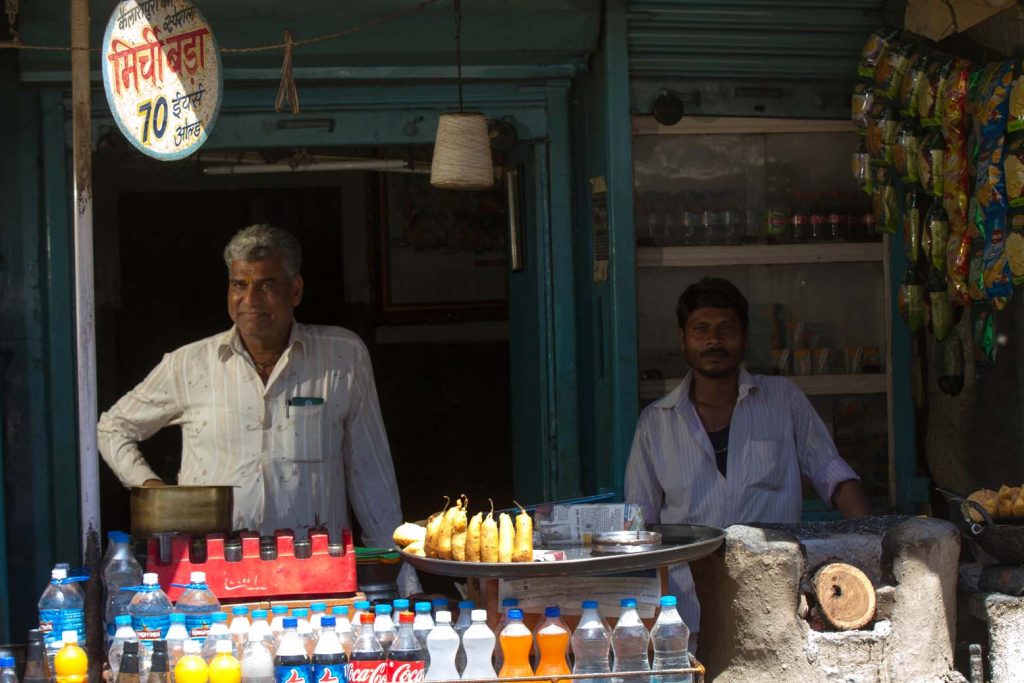
[ezcol_1half]
A retake of the Guddu shot, a snap of the silent proprietor, and we hit the road. Not wanting to pile this post with pictures similar to those of the previous, let’s just say the afternoon was bliss; on leafy lane and arid hill: halting at lake, river and any other spot that drew my eye; or to greet women in the fields with a smiling namaste.
That said, Guddu tells me Ram Ram is better in the countryside, with Ram ba for old men – ‘like you’, he can’t resist adding – or Ram bai for old women.
And what if they are Muslim?
They won’t be, not in the villages. And if they were it still wouldn’t be a problem. Country people don’t think like that.
[/ezcol_1half] [ezcol_1half_end]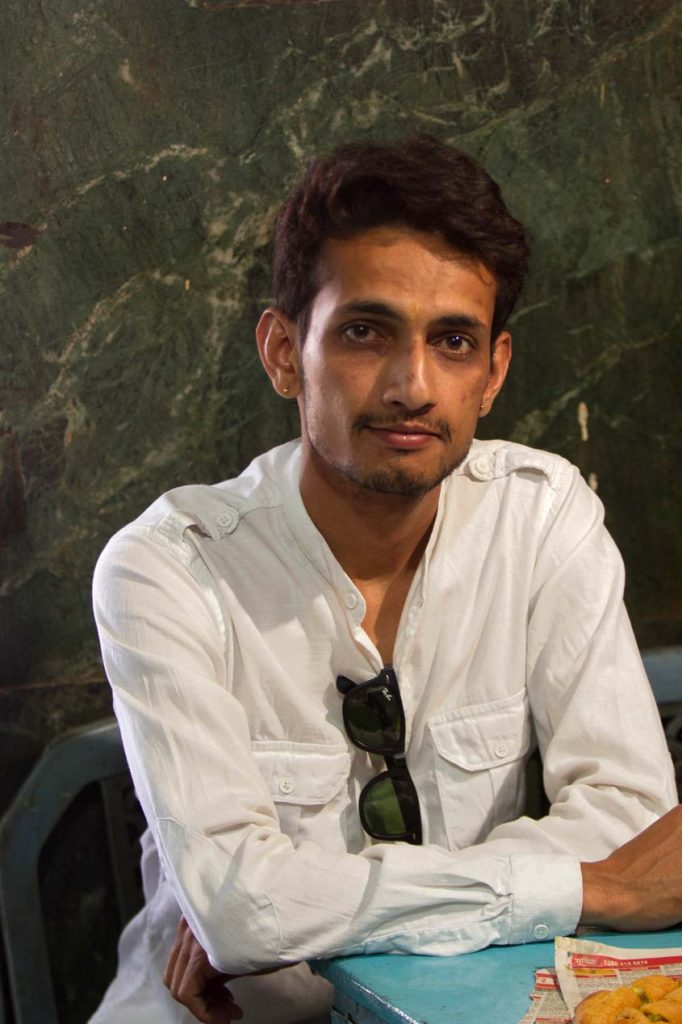 [/ezcol_1half_end]
[/ezcol_1half_end]
Close to Tiger Lake, spoken of in October, Guddu takes me to an upmarket township in the making. Plots are laid out, divided by low brick walls. Why am I not surprised to learn that Guddu, at a low in the market three years ago, sank a few lakhs into the purchase of four plots, 10,000 square foot in all? And that he now has a buyer for one plot, bought for £3k, who’ll pay £8k, allowing Guddu to build on one of the others? Once in a while you come across such men – with India disproportionately represented – for whom making money comes as naturally as sleep or sex.
We stop for late lunch at a posh joint set to get posher as the township develops. Over good food and better (because Danish) beer Guddu tells me he’ll move parents and grandfather from the traffic polluted city. They all, mother in particular, love the country and approve the plan. Naturally, Guddu will keep the town house and travel agency on the ghat. He’ll convert three family rooms to augment the two existing paying guest rooms, one of which I occupy, and if he’s not a millionaire at thirty-five then I can’t read character to save my life.
* * *
Yesterday evening. As Guddu sits on my window seat, lit by a sun low and orange over the lake, I tease him. Why don’t we smoke this joint downstairs with your dad? That lands. With hand on heart he assures me such a thing is so far beyond the pale it doesn’t bear thinking about.
[ezcol_1half]
High as a kite I chuckle, take a few snaps – even getting it together to fumble with flash kit, and reflector disk to bounce back some of those instreaming rays – then join him at the window in more or less silent communion.
* * *
Later Jai joins us. The two ask me – over another tobacco-lite but now perfectly conical Jai creation – what is life?
Only in India …
Word’s got round, you see, that I’m a bit of a philosopher.
[/ezcol_1half] [ezcol_1half_end]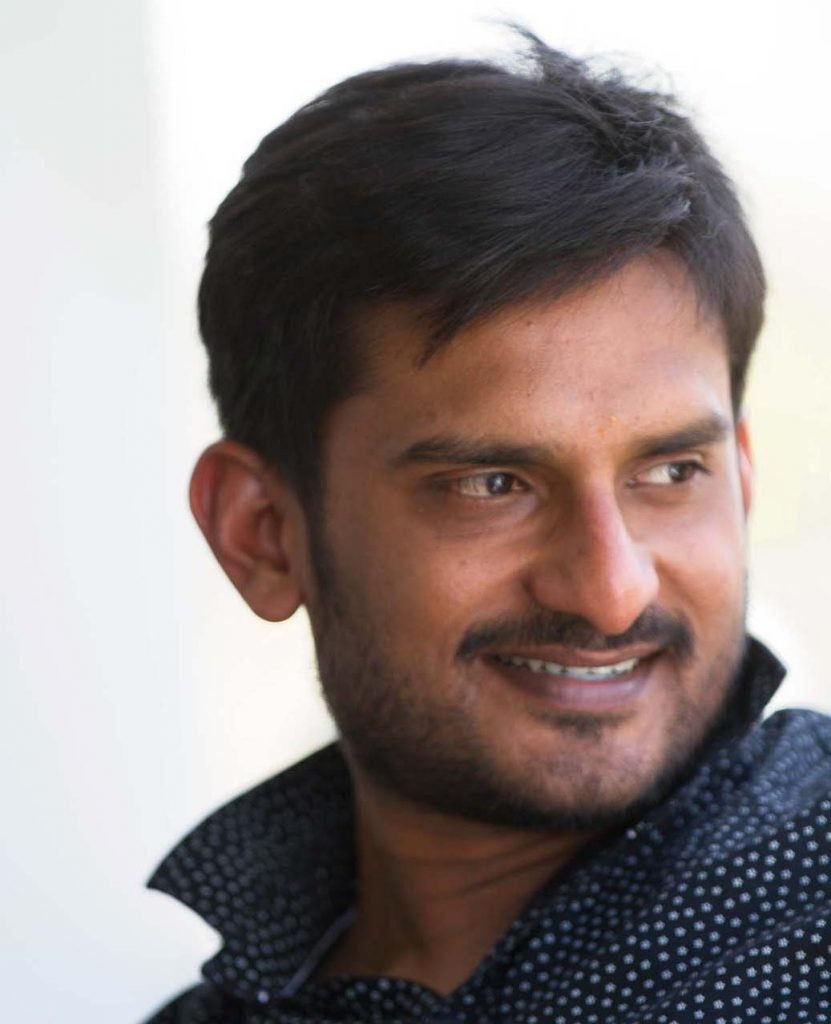 [/ezcol_1half_end]
[/ezcol_1half_end]
I’m stoned but serious, giving my all to the question. While my answer is far from original – how could it be, without being glib or otherwise phoney, to a question like that? – it comes from a place more important, a place of authenticity.
[ezcol_1half]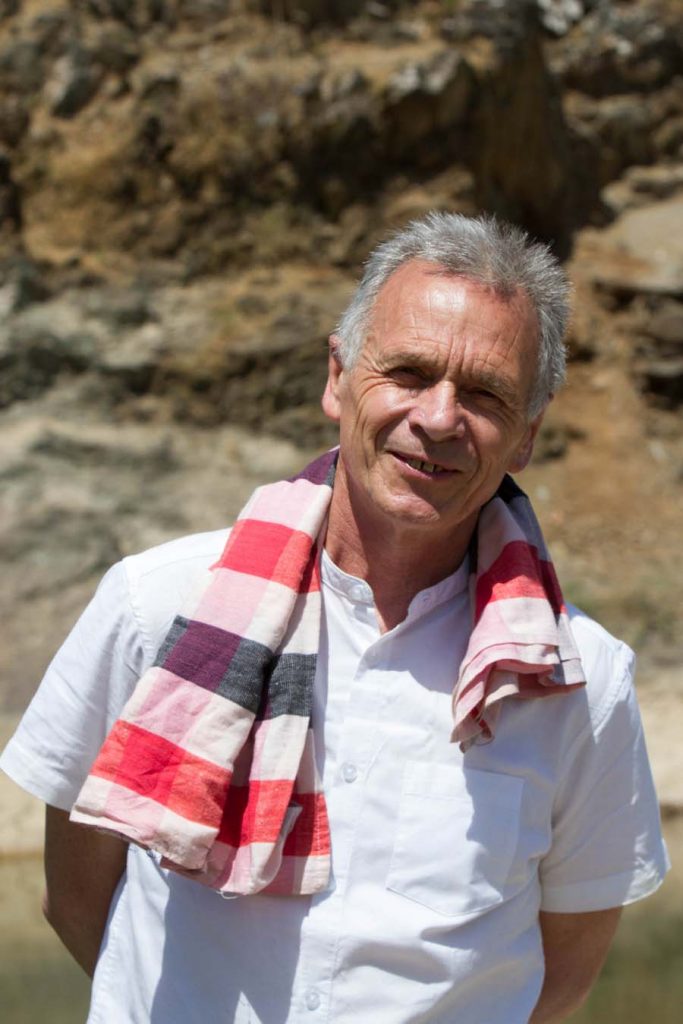 [/ezcol_1half] [ezcol_1half_end]
[/ezcol_1half] [ezcol_1half_end]
Life is love.
I didn’t know I knew that. But I mean it and, without getting lost in complexity, tell them why I mean it and why love’s antithesis is not hate but fear. They’re impressed. Both stand to offer a hand.
Good answer.
The night of Holi – the night of the big bhang lassi – Jai had said the only thing that matters is to be happy. As bhang and Holi swept me along, I’d returned a few times to the claim. It didn’t seem quite right. I recalled something my flawed but brilliant teacher once said.
You know what matters more than being happy? Being real.
[/ezcol_1half_end]
I love the way India leaves all the room in the world for long and easy conversational gaps. Gaps in which the authentic and contemplative, as opposed to the fast and smart, can flower. Quiet minutes later it strikes me that being happy and being real aren’t so hard to reconcile.
Maybe – ultimately – it’s the same thing.
They like that too, though I didn’t look quite such a clever Buddha a few hours later when, after an allegedly medium bhang lassi, Guddu and Lalit (below) had to carry me to my bed, on which I lay motionless for hours, thinking splendid thoughts and wandering magical lands.
Boum Shankar!

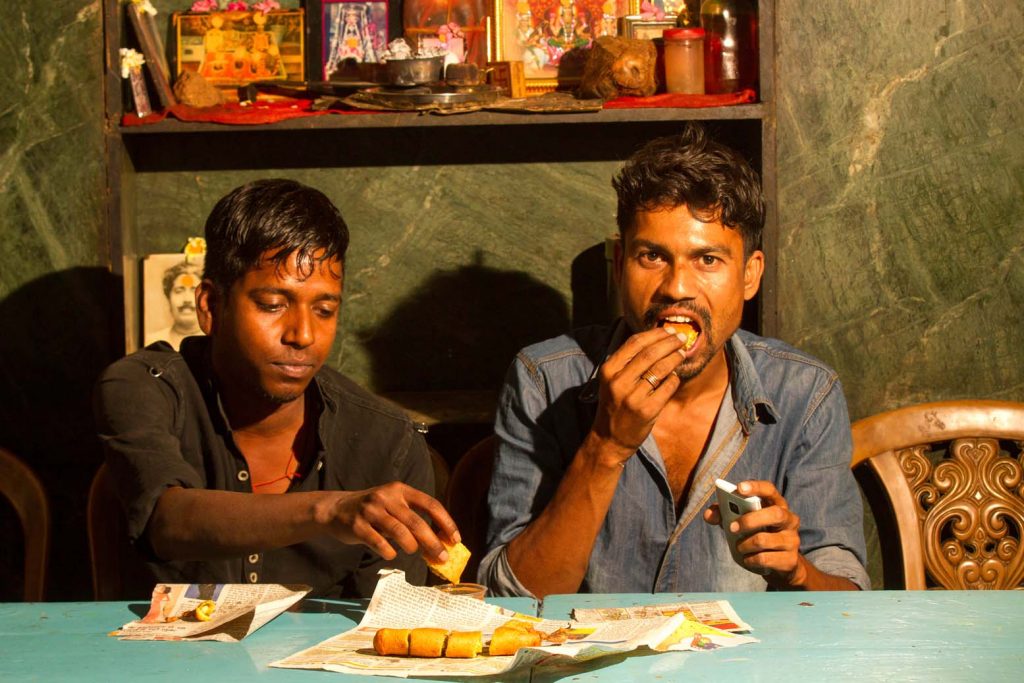
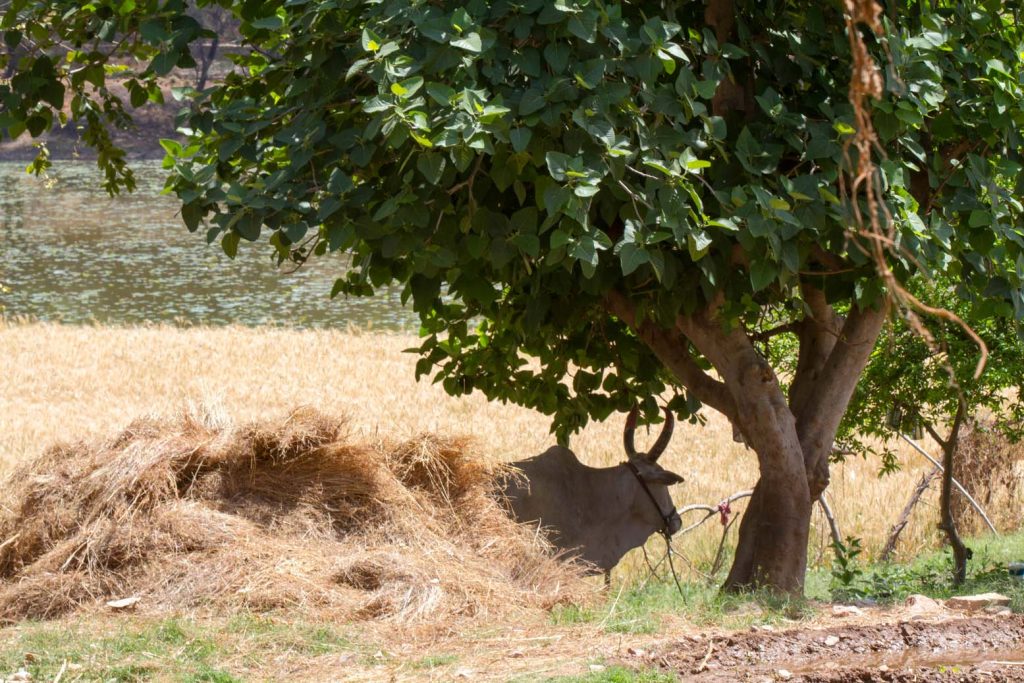
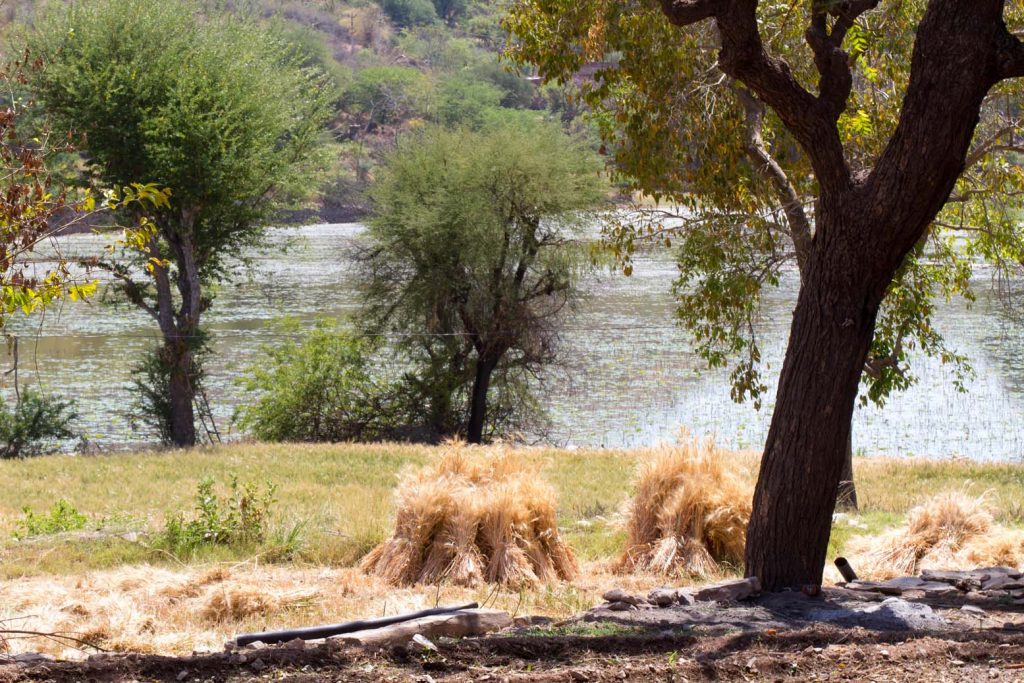
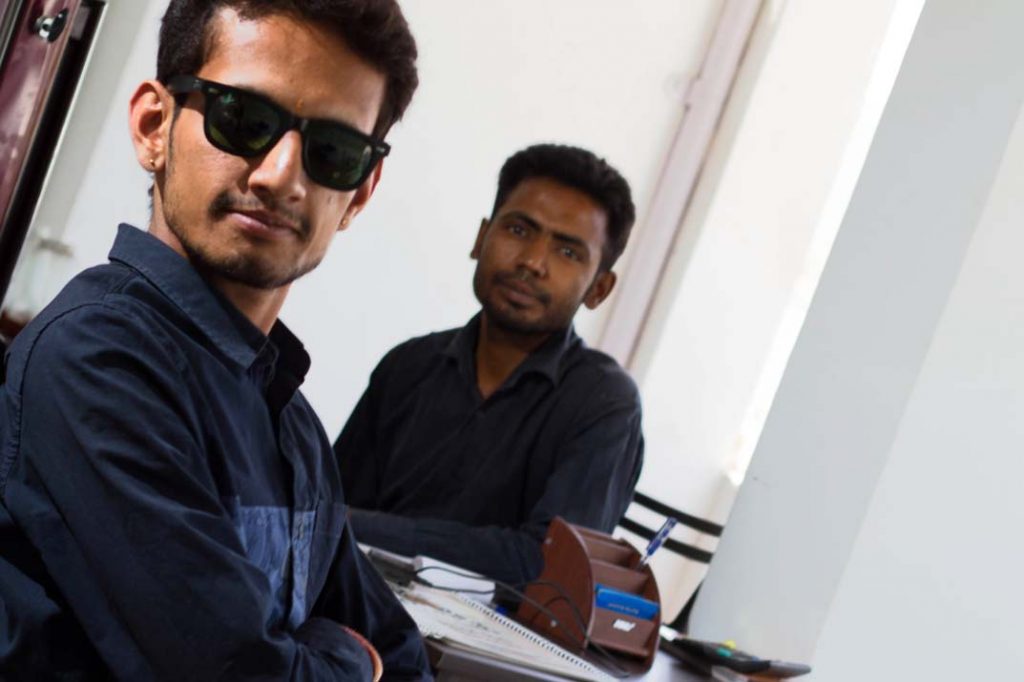
What a mixture of a brillant storyteller and astute philosopher you are ! Thank you
Thanks Alain!